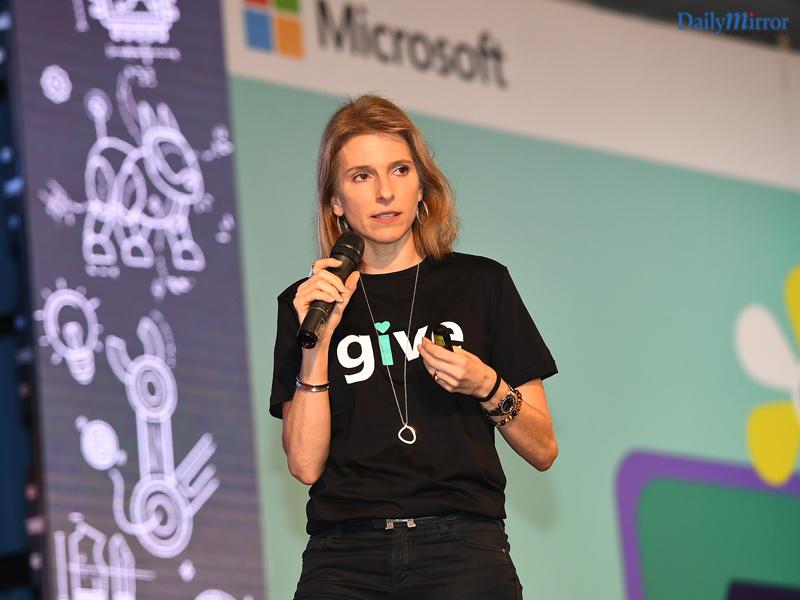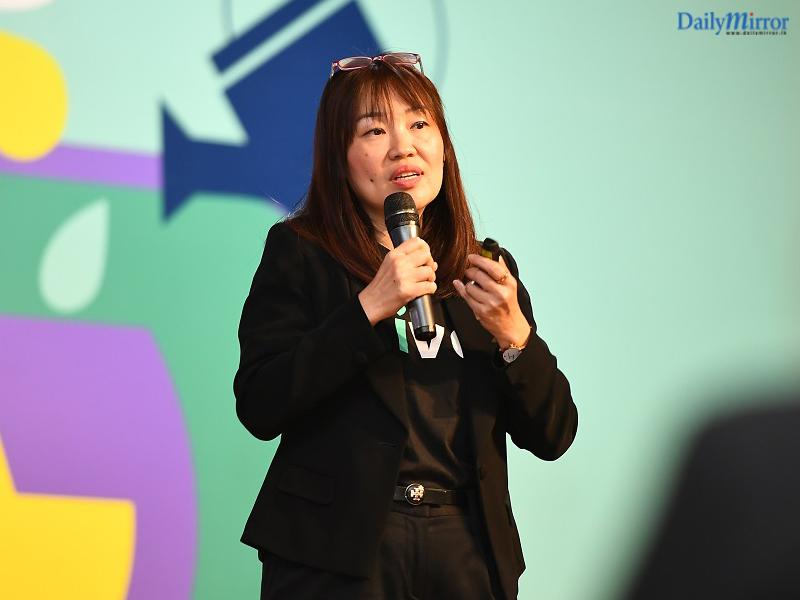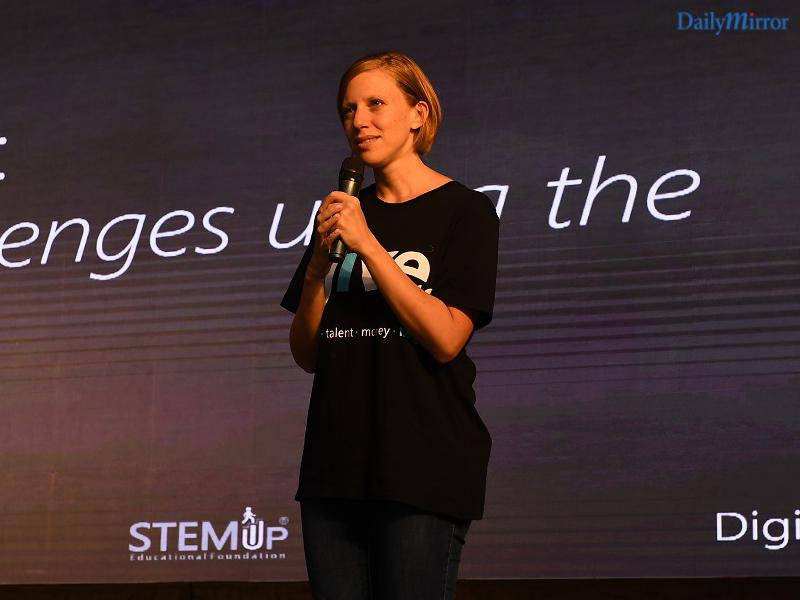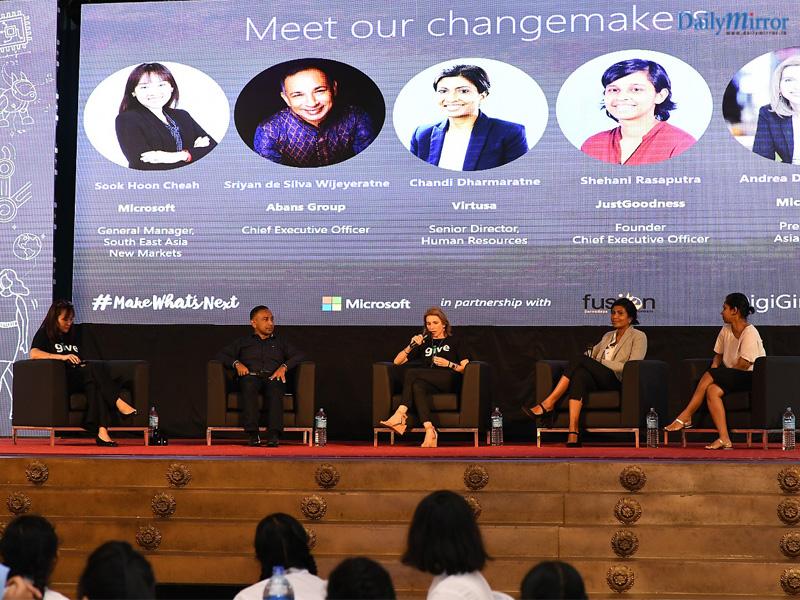Reply To:
Name - Reply Comment

In celebration of International Women’s Day (8), Microsoft hosted a full day session for #DigiGirlz in Sri Lanka. Over 500 girls, including their parents and teachers, experienced career coaching sessions, heard from an esteemed group of industry leaders in a panel discussion, and participated in a coding project using Microsoft MakeCode. The event was held at the Office of the Prime Minister of Sri Lanka and was designed to provide girls, as well as educators, with a better understanding of what careers in technology can be like—exposing girls to female role models, and engaging girls into hands-on activities where they use STEM skills to solve real-world challenges.
Andrea Della Mattea, President for Asia Pacific at Microsoft, Sook Hoon Cheah, General Manager for the Southeast Asia New Markets, Daiana Beitler, Philanthropies Director for Asia, and others from Microsoft’s regional leadership team conducted group workshops to uplift and encourage young women to pursue leadership roles and careers in Science, Technology, Engineering and Math (STEM).
In her keynote, Della Mattea said: “At Microsoft, our mission is to empower every person and every organization on the planet to achieve more. We strive to create a diverse and inclusive environment which enables and inspires all people to achieve more.Attracting, developing and helping women in STEM fields to thrive is vital for an inclusive society and prosperous country.”
Globally, women are underrepresented in STEM. According to UNESCO, 29 percent of those in science research and development are women, with a low of 19 percent in South and West Asia and a high of 48 percent in Central Asia.
In Asia Pacific, a recent survey conducted with YouGov highlighted that about a third of teachers (32 percent) have the mindset that girls’ lack of interest in computer science is the primary reason explaining their under-representation in the field, before other factors such as lack of parental support and issues with curricula not being applied to real-world applications.

Career coaching workshops, led by the Microsoft Asia Pacific leadership, provided the girls with guidance on how to connect their own passion with STEM. They encouraged the participants to adopt a growth mindset by helping them think about challenging themselves and to break down their goals into smaller actionable steps.
At the panel discussion on “shaping an innovative and diverse future in Sri Lanka and beyond”, Andrea Della Mattea, Sriyan De Silva Wijeyeratne, Group CEO, Abans Group of Companies, ChandiDharmaratne, Head of Human Resources, Virtusa and ShehaniRasaputra, Founder/CEO, JustGoodness shared their views on encouraging girls in Sri Lanka to embrace STEM education and broaden their horizons with new opportunities to learn, lead and grow.
Moderating the discussion, Cheah said: “In Sri Lanka, there are more women in higher education than men; but when you look more closely, the girls are not taking STEM subjects in great numbers. Although more than half of the undergraduates in Sri Lanka are female students, they overwhelmingly concentrate on liberal arts and social studies. Encouraging more girls to take technology disciplines will increase their career opportunities in technical areas where wages are high.”
In the afternoon, the participants formed smaller working groups to solve societal challenges using interactive coding. Microsoft MakeCode brought computer science to life for the participants with fun projects through both block and text editors for learners at different levels. The MakeCode editor provided by Microsoft made it easy for the students to program their micro:bit units—tiny programmable computers designed to make learning and teaching easy and fun—using Blocks, JavaScript, and Python.
“We want to change how young women in Sri Lanka view STEM by letting them envision how technology, science, engineering, and math can be used as tools to solve global challenges,” said Beitler. “To make this possible, we are introducing young women, including those from underserved communities, to female role models as well as hands-on, purpose-driven experiences where STEM concepts are linked to real-life situations.”
Microsoft is committed to the digital transformation of Sri Lanka through skills development, business ecosystem support and industry acceleration of cloud computing. The company will continue its ongoing role in women empowerment.
To learn more about Microsoft’s commitment to close the gender gap in STEM, visit https://www.microsoft.com/en-us/digital-skills/girls-stem-cs.Microsoft will be continuing their #MakeWhatsNext campaign through other DigiGirlzevents in Asia Pacific and around the world, to encourage girls to build 21st-century skills and learn about careers in technology.


To find out more about Microsoft Philanthropies’ initiatives in Asia, visit https://news.microsoft.com/apac/category/philanthropies-asia/.